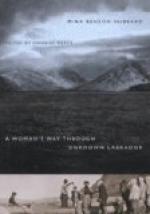Our camp that night was on a high sand-bank on the north shore of the river. The place chosen looked rough and unpromising to me, for the ground was thickly strewn with windfalls. All this part of the country had been burned over many years ago, and was very desolate looking. The men, however, pronounced the place “Ma-losh-an! Ma-losh-an!” (fine! fine!) and in less than an hour the tents were pitched and made comfortable. New experiences seemed to be coming thick and fast, for we had supper of porcupine down on the rocks at the shore. I did not like it.
I used my air mattress that night, building it up at the head with my dunnage bag, and at the foot with boughs. My hot-water bottle was also called into requisition, for it was cold. They were both better than I had hoped, and I slept as comfortably as if in the most luxurious apartment.
CHAPTER III
CLIMBING THE RAPIDS
The call “All aboard,” came at about six o’clock on Thursday morning. We had breakfast, and started at 8 A.M. A cold northwest wind was blowing, and an occasional light shower fell. The sand-hills on either side of the river grew higher as we went up, with always the willows along the water edge. Miles ahead we could see Mounts Sawyer and Elizabeth rising blue and fine above the other hills, and thus standing up from the desolation of the burnt lands all about; they came as a foreword of what was awaiting us further on.
Not far from camp we took another porcupine. There were beaver signs too, willows cut off and floating downstream along the shore. Leaning over, Job picked one up and handed it back to me to show me how cleverly they do their work. A rabbit ran up from the water edge. Now it was a muskrat lying in among the willows. He was evidently trying to decide which way to go, and in a moment or two began swimming straight towards the pistols that were being loaded for him. I was a little startled and exclaimed “Why, what’s the matter with him? Is he hurt?” Whereupon the men laughed so heartily that the rat almost escaped. I did not understand that it was the swift current which was carrying him against his will directly towards us, and could only think that he must have been sick, or hurt perhaps, to make him do so strange a thing. From that time forward, “What’s the matter with him? Is he hurt?” became a byword in camp.
Thirteen miles above Grand Lake we reached the portage route by which the Indians avoid the roughest part of the river. It leads out on the north bank opposite the mouth of the Red Wine River, passing up to the higher country, through a chain of lakes, and entering the river again at Seal Lake. By this route the Indians reach Seal Lake from Northwest River in less than two weeks, taking just twenty-one days to make the journey through to Lake Michikamau.




